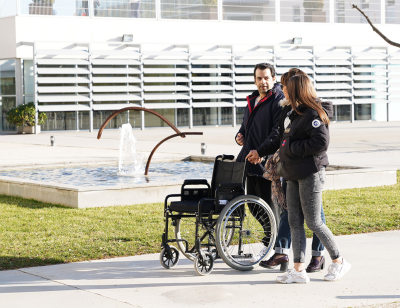1
Do regular physical activity
Physical activity is considered to be any muscular movement produced by the skeletal muscles that involves the consumption of energy. Physical activity is a protective factor in the prevention and treatment of non-communicable diseases such as heart disease, cardiovascular accidents, diabetes, and breast and colon cancers. It is also associated with better mental health (greater stress tolerance, reduced anxiety, more emotional stability and control of sleep disorders), delayed onset of dementia, and better quality of life and well-being.
Being physically active is important at all ages and it is possible whatever our physical condition or state of health. The recommendation is that we do at least 150 minutes of physical activity a week.
In addition, it promotes contact with others and helps build a wider social network, resulting in increased mental stimulation and better cognitive functioning. This is why we promote physical education and adapted sport as part of our rehabilitation process at the Institut Guttmann.
2
Follow a varied and balanced diet
Following a healthy and balanced diet is essential for our health in general and also for our cognitive functioning. The Mediterranean diet is recognised by the international scientific community as one of the most balanced and healthy ways of eating, and its involvement in preventing cardiovascular disorders has been demonstrated.
A healthy diet is based on eating plenty of vegetables, cereals, legumes and olive oil, and on a preference for seasonal and local products.
3
Look after your relationships
Maintaining the quality and quantity of relationships with friends, family, colleagues, neighbours and acquaintances is a very important factor for better cognitive and psychological health. Remember that it is never too late to make new friends or reconnect with old ones.
Friends help us celebrate the good times and offer support during the bad times. They stop us from feeling lonely and increase our sense of relevance and purpose, reduce stress and increase happiness, improve self-confidence and self-esteem, help us cope with traumatic situations and motivate us to ditch an unhealthy lifestyle or avoid one.
4
Sleep well
Sleep is associated with better cognitive function and less brain atrophy in old age. The Global Council on Brain Health (GCBH) gives us the following advice: sleep 7 to 8 hours every 24 hours; establish regular times for going to bed and getting up; keep your bedroom dark, quiet and at a comfortable temperature; limit the use of your bedroom to sleeping; and expose yourself to light during the day.
5
Have a purpose in life
Enjoy what we have done in the past without forgetting to think of the future, take time to identify what is really important to us and organise our time to live according to these principles. Studies from the Department of Behavioral Sciences at Rush University, USA indicate that people with a higher level of purpose in life are half as likely to develop dementia. Having purpose in life means believing that life has meaning, maintaining a personal value system, and feeling motivated to achieve future goals and overcome challenges.
6
Do cognitive stimulation activities
To maintain a good level of intellectual functions like attention, orientation, memory and language, it is important to train our brain. This could, for example, include activities such as studying, solving crosswords, word searches, puzzles, games (also computer games), etc. for 30-45 minutes two or three days a week.
The Institut Guttmann’s Barcelona Brain Health Initiative (BBHI) research project is aimed at finding out more about our brain and understanding how to keep it healthy, based on the idea that a healthy brain is key to a fulfilling life. Find out more about brain health and read more tips on how to make it work better (https://bbhi.cat/es/) on our project website.




